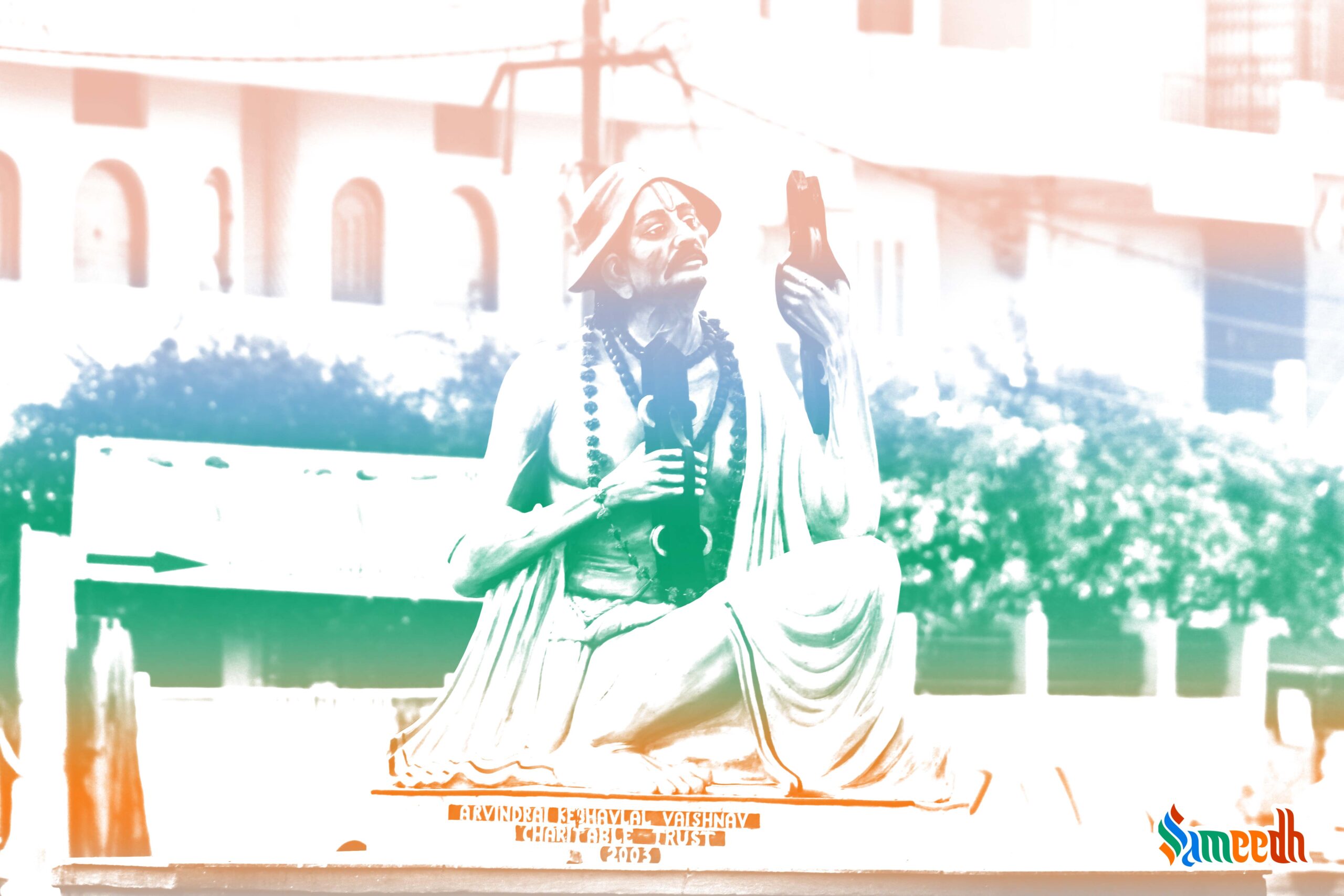Bhakt Kavi Narsinh Mehta is well known for his devotion towards Bhagwan Shree Krushna. He was a spiritual poet and has composed over 22,000 hymns and poems. His most popular bhajan is ‘Vaishnav jan to’, which had inspired Mahatma Gandhi as well.

Statue of Narsinh Mehta in Vadodara; Image Source: Snehrashmi
Gujarati poet Narsinh Mehta is renowned for his devotion to Bhagwan Shree Krushna. He is usually referred to as Narsi Bhagat or Bhakt Narsaiyo. The creation of Akhyans, Urmikavyas and Prabhatiyas is attributed to Narsinh Mehta. He composed the Prabhatiya, which is sung at the time of dawn. Five hundred years later, his poems and hymns are still popular amongst people.
Birth and family history
Narsinh Mehta was born in 1414, in Talaja (Bhavnagar district), to Shri Krishnadas Mehta, who belonged to the Vadnagar Naagar Brahmin clan. They chose to live in Junagadh. He was just five years old when he lost both of his parents. As a result, his grandmother Jayagauri raised him. He was not able to speak till the age of eight years. His grandmother was deeply concerned for Narsinh. According to narrative, once when Narsinh and his grandmother were returning after listening to the Bhagavad Katha, they met a sage on their way back. Narsinh’s grandmother greeted the sage and informed him of the issue with little Narsinh. The sage looked into young Narsinh’s eyes and whispered the mantra ‘Radhe Govind’, in his ear. Narsinh, a mute child, was encouraged to chant the name ‘Radhe Govind’, and gradually, he began to speak. When everyone saw this, they were all in disbelief, but Narsinh’s grandmother was overjoyed. Ever since, Narsinh Mehta evolved into Narsinh Bhagat as a result of his dedication to Bhagwan Shree Krushna.
Marriage and family life
Narasih Mehta wed a woman named Manekbai in the year 1429. Few years after marriage, Narsinh Mehta and his wife were blessed with a son named Shamaldas, and a daughter named Kuvarbai.
His grandmother passed away during this time. But Narsinh’s disinterest towards worldly matters prevailed. Manekbai was a kind person. She used to make sure that nothing hindered her husband from his devotion to Bhagwan Shree Krushna. Manekbai took complete responsibility of the household matters, while, Narsinh Mehta was wholly engrossed in his devotion for Shree Krushna.
Marriage of his children
The story of both his children’s marriage is really interesting. Given that Narsinh Mehta was extremely poor, people used to wonder how he would manage to marry his children off. But, it is said that Kunvarbai’s marriage ceremony was held with a great pomp and show. It is believed that, Bhagwan Shree Krushna had arranged for everything and made sure that His beloved devotee is not let down in any manner. Similarly, his son’s marriage ceremony was held in such a manner that the entire village realised the power of Narsinh Mehta’s devotion and God’s blessing.
Death of his wife and son
Soon after the marriage, Narsinh Mehta’s son and daughter-in-law passed away in an accident. By the passing of their son and daughter-in-law, Narsinh Mehta’s wife Manekbai was shocked. Manekbai succumbed to her grief over the loss of her son after being unable to bear the pain. But even in this situation, Narsinh Mehta was undeterred and continued his devotion to Bhagwan Shree Krushna.
Narsinh Mehta’s compositions
Narsinh Mehta’s poems are typically viewed Hindu bhakti as well as bhajans to Krushna. His poems and bhajans have been recited in Gujarat for more than five centuries. Compositions as per the narratives based on Shrimad Bhagwatam, Sudama Charit, Dana Leela, Chaturis etc. Radha and Krushna-themed love poems, devotional songs, philosophic poems, and didactic writings. His other famous compositions include compositions showing the acceptance of Harijans and Kunvarbai nu mameru, Putra Vivah, Har Mala, Jhari na pada, Hundi and others.
Narsinh’s work was frequently quoted by Mahatma Gandhi in his writings, lectures, and public prayers. His bhajan ‘Vaishnav Jan To tene re kahiye’ became a global hymn of compassion, moral uprightness, and duty to humanity as a result of Gandhi’s regular references to it. Gandhi elevated Narsinh’s work and life far beyond religious perspective and into larger philosophical and ethical themes.
Narsinh Mehta’s death
The actual reason behind his death is not mentioned anywhere. However according to a narrative, it is reported that Bhakt Narsinh Mehta passed away in 1488 at the age of 79, in a village named Mangarol in Kathiyawad. Currently, this village has a cremation site named as ‘Narsinh Mehta Smashan’. Narsinh Mehta is believed to have been cremated there.
